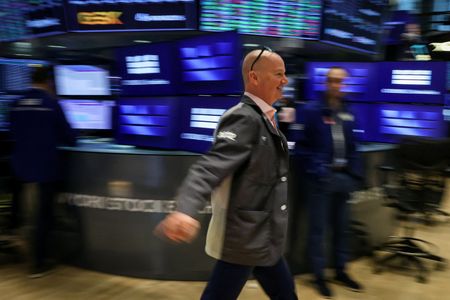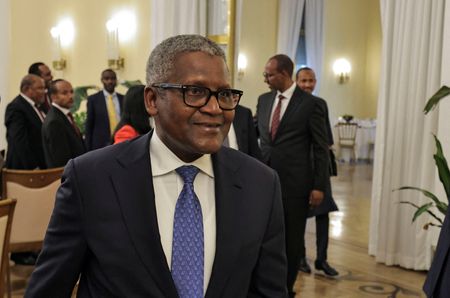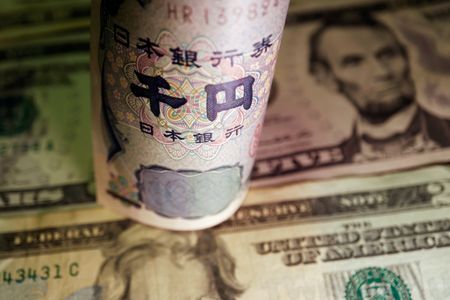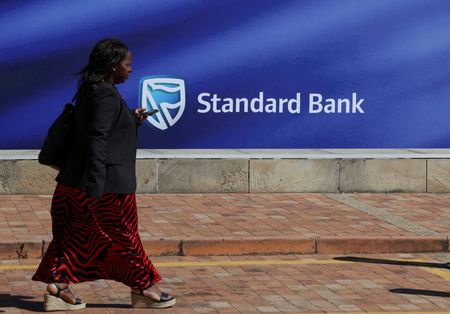By Sinéad Carew and Dhara Ranasinghe
NEW YORK/LONDON (Reuters) -MSCI’s global equities index rose slightly on Wednesday while U.S. Treasury yields fell and Wall Street indexes were a mixed bag as investors waited for U.S. Congress to end a federal shutdown, which will provide greater economic clarity with government data releases resuming.
In currencies, the yen was also in the spotlight as its fall to nine-month lows against the dollar prompted more comments from officials in Japan. And in U.S. Treasuries, yields were lower as investors prepared for more Federal Reserve rate cuts due to weak data and comments from central bankers.
Meanwhile, the Republican-controlled House of Representatives is due later on Wednesday to vote on a compromise that the Senate approved on Monday, to restore funding to government agencies and end a shutdown that started on October 1. The government closure disrupted food benefits for millions, left hundreds of thousands of federal workers unpaid, snarled air traffic, and paused economic data releases.
While the Dow rose, the Nasdaq and the S&P 500 fell as investors sold off heavyweight technology stocks in favor of value stocks.
“People are feeling better about taking a little bit more risk. Money is flowing to some parts of the market that have been underperforming,” said Irene Tunkel, chief U.S. equity strategist at BCA Research.
BOSTIC ANNOUNCES RETIREMENT
On Wall Street, as of 11:28 a.m. (1628 GMT), the Dow Jones Industrial Average rose 320.57 points, or 0.67%, to 48,248.53, the S&P 500 fell 5.30 points, or 0.08%, to 6,841.31 and the Nasdaq Composite fell 126.72 points, or 0.54%, to 23,341.58.
MSCI’s gauge of stocks across the globe rose 1.64 points, or 0.16%, to 1,010.83.
The pan-European STOXX 600 index rose 0.72%, while Europe’s broad FTSEurofirst 300 index rose 18.00 points, or 0.78% with both indexes hitting record highs, led by banks.
In the U.S. Treasuries market, which was closed on Tuesday for Veterans Day, prices rallied, driving yields lower on Wednesday as investors bet on further Fed rate cuts after Tuesday’s weekly jobs data from ADP, which showed that U.S. private employers shed jobs in the four weeks ending on October 25.
Atlanta Federal Reserve President Raphael Bostic announced that he would retire in late February. Since he had voiced concerns about high inflation and sounded cautious about rate cuts in recent public comments, BCA’s Tunkel said that investors were likely betting that he would be replaced by a more dovish official since the White House favors lower rates.
She also pointed to New York Federal Reserve President John Williams’ reiteration on Wednesday that the time is getting closer for a U.S. central bank restart of bond purchases as part of its effort to maintain control over short-term rates.
The yield on benchmark U.S. 10-year notes fell 4.5 basis points to 4.065%, from 4.11% late on Monday. The 30-year bond yield fell 4.2 basis points to 4.6598% from 4.702%.
The 2-year note yield, which typically moves in step with interest rate expectations for the Federal Reserve, fell 2.7 basis points to 3.564%, from 3.591% late on Monday.
In currencies, the U.S. dollar gained on the euro and the yen as traders evaluated what a flood of economic releases will mean for Fed rate policy if the government votes to reopen, as is expected.
The dollar index, which measures the greenback against a basket of currencies including the yen and the euro, rose 0.03% to 99.48, with the euro up 0.09% at $1.1591.
Against the Japanese yen, the dollar strengthened 0.37% to 154.72.
The yen’s decline to nine-month lows had prompted fresh signs of angst from Tokyo, with Finance Minister Satsuki Katayama saying she would not deny that the negative aspects of the weak yen on the economy have become more pronounced than the positive ones.
Sterling weakened 0.17% to $1.3128 with politics in focus. British health minister Wes Streeting denied on Wednesday he was plotting to bring down Keir Starmer, after unnamed allies of the prime minister briefed newspapers that they feared an attempted coup could come after the November 26 budget.
Oil prices fell more than 3% on oversupply concerns as OPEC said global oil supply will match demand in 2026, marking a further shift from its earlier projections of a supply deficit.
U.S. crude fell 3.72% to $58.77 a barrel and Brent fell to $62.99 per barrel, down 3.33% on the day.
Gold prices rose ahead of the House vote on the government reopening in anticipation of economic data that could set the stage for a December rate cut.
Spot gold rose 1.41% to $4,184.48 an ounce. U.S. gold futures rose 1.71% to $4,177.00 an ounce.
(Reporting by Sinéad Carew in New York, Dhara Ranasinghe in London; additional reporting by Gregor Stuart Hunter in Singapore and Samuel Indyk in London; Editing by Jane Merriman, Aidan Lewis and Ros Russell)











